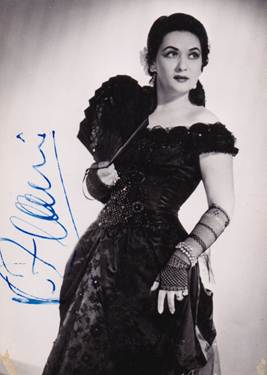
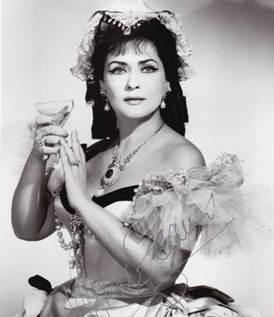
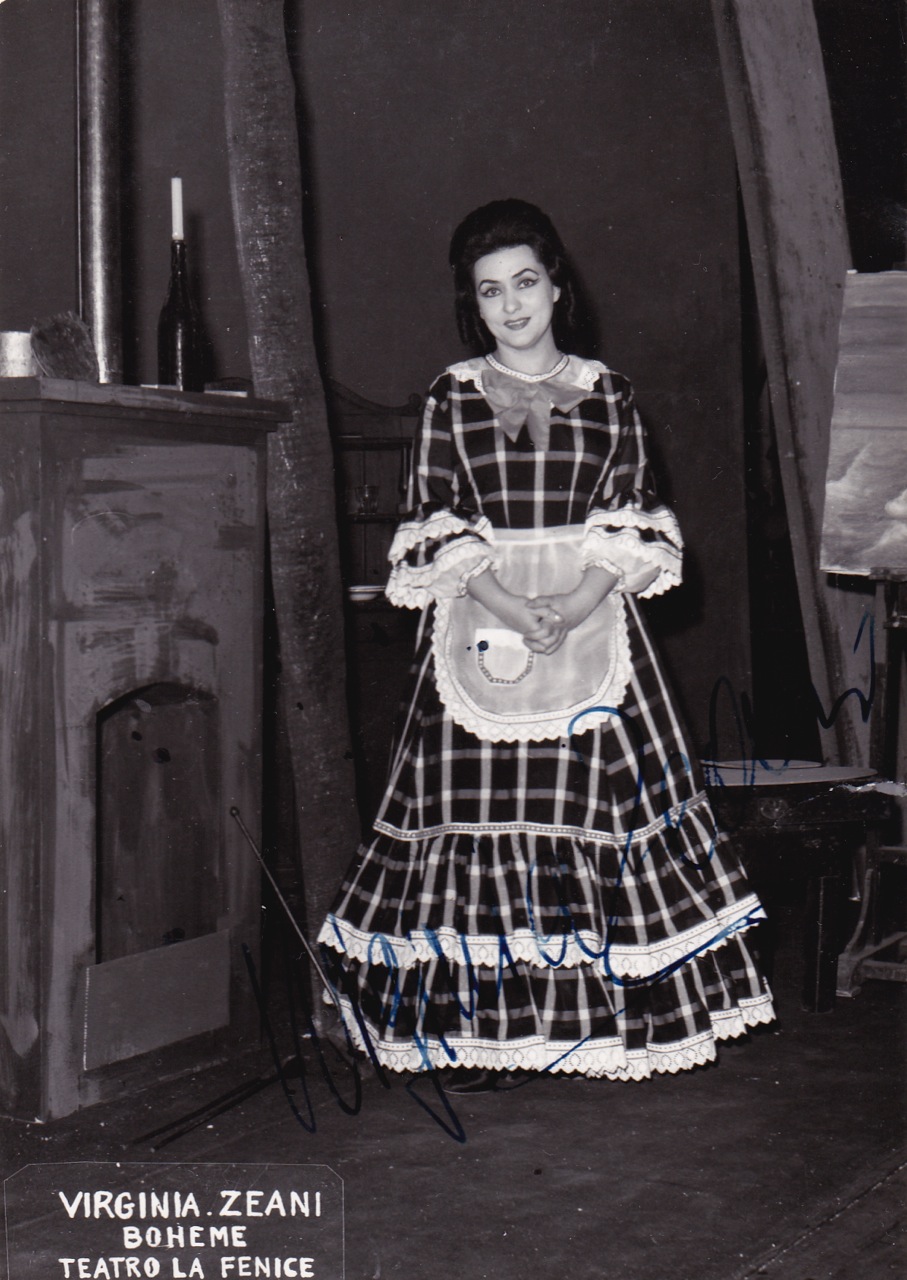 (all photos Charles Mintzer collection)
(all photos Charles Mintzer collection)
VIRGINIA ZEANI by Roger Beaumont


 (all photos Charles Mintzer collection)
(all photos Charles Mintzer collection)
Virginia Zeani was born in Solavastru - a region of Transylvania in Romania on 21 October, 1925 (not 1928 as is often reported). At the age of thirteen, she began serious study in Bucharest . She later studied with the famous Russian soprano Lydia Lipkowska, who molded the young Virginia into a top-flight lyric-leggiero soprano. In March of 1947 at the age of twenty one and with an established vocal range from low g to top f, Virginia traveled to Italy to study with the veteran tenor Aureliano Pertile.
In addition to the help she was receiving from Pertile, Virginia also presented herself to Toscanini's coaches at La Scala. The traditions passed on to her by Narducci, Fornarini, Gennai and Tonini in Milano and by Piazza, Marini and especially by old Luigi Ricci - who had been a repetiteur for Puccini and Mascagni in Rome - aided dramatically to her ability to create characters within her voice. She learnt from these famous people, all the arts associated with the science of singing, a style of teaching that is rare today.
In May of 1948, at the Teatro Duse in Bologna, Virginia made her debut in their new production of Verdi's TRAVIATA. Her rare combination of voice, dramatic commitment and physical beauty made her debut an enormous success. The role of Verdi's heroine, remained in her repertoire for the rest of her career - in fact Virginia has performed the role 648 times which must be the record for any soprano in the performing history of this opera
Virginia wisely took the advice of her teachers and coaches and accepted mainly light-lyric roles, whilst basing the main part of her repertoire on the bel canto roles of Bellini, Rossini and Donizetti. As well, she performed such roles as Mimi in LA BOHEME, Gilda in RIGOLETTO, Marguerite in FAUST, the Manon of Massenet and Adina in L'ELISIR D'AMORE, which she first sang in Cairo with Beniamino Gigli, then in the twilight of his long career. Her Florentine debut took place in 1952 in Bellini's lovely I PURITANI (Serafin asked her to replace Maria Callas) and it was in this production that she first met and worked with her husband-to-be, Nicola Rossi Lemeni.
The Teatro alla Scala in Milan called for her in 1956 and offered her the role of Cleopatra in Handel's GIULIO CESARE. The cast today seems very strange, especially the casting of the heroic tenor Franco Corelli as Sextus. The wonderful Giulietta Simionato sang Cornelia and in the German fashion, the title role was assigned to a bass - Nicola Rossi Lemeni. Three months later, she and Rossi Lemeni married. Their son Alessandro was born about a year later. He is now a leading surgeon in Rome.
The world premiere production of Poulenc's DIALOGUES OF THE CARMELITES in January of 1957 at La Scala, found Virginia in the leading role of Blanche. Virginia was in great demand all over Italy and Europe. She somehow found the time to carry out guest appearances in such diverse places as Dublin, Madrid, Mexico City, Zurich, Lisbon and Rio de Janeiro. Her American debut took place in Philadelphia in 1958 as Cleopatra in Handel's GIULIO CESARE. That role also served as her New York debut a little later in the month. Following appearances as Olga in IVAN THE TERRIBLE at Palermo, she sang her first Margherita in MEFISTOFELE and then THAIS with the San Carlo Company in Naples.
In 1962, the Teatro San Carlo in Naples decided to revive Donizetti`s opera MARIA DI ROHAN. With Virginia taking the leading role, she sang in true Bel Canto style and received such an ovation that the San Carlo decided in 1965 to mount a production of Rossini's opera ZELMIRA for the first time this century. In Rome, Virginia appeared in specially mounted revivals of Rossini`s opera OTELLO and of Verdi's long neglected opera ALZIRA. The ALZIRA production became the big hit of the season.
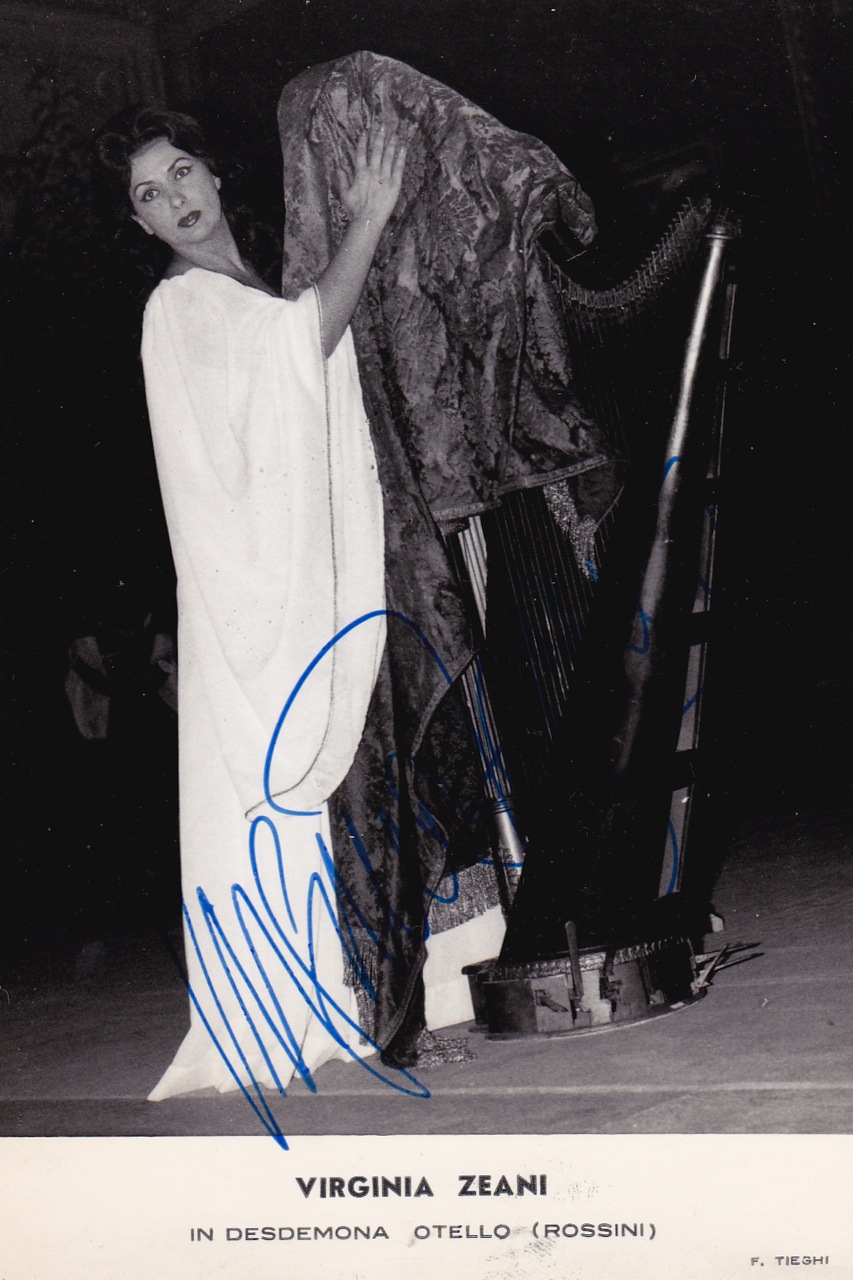
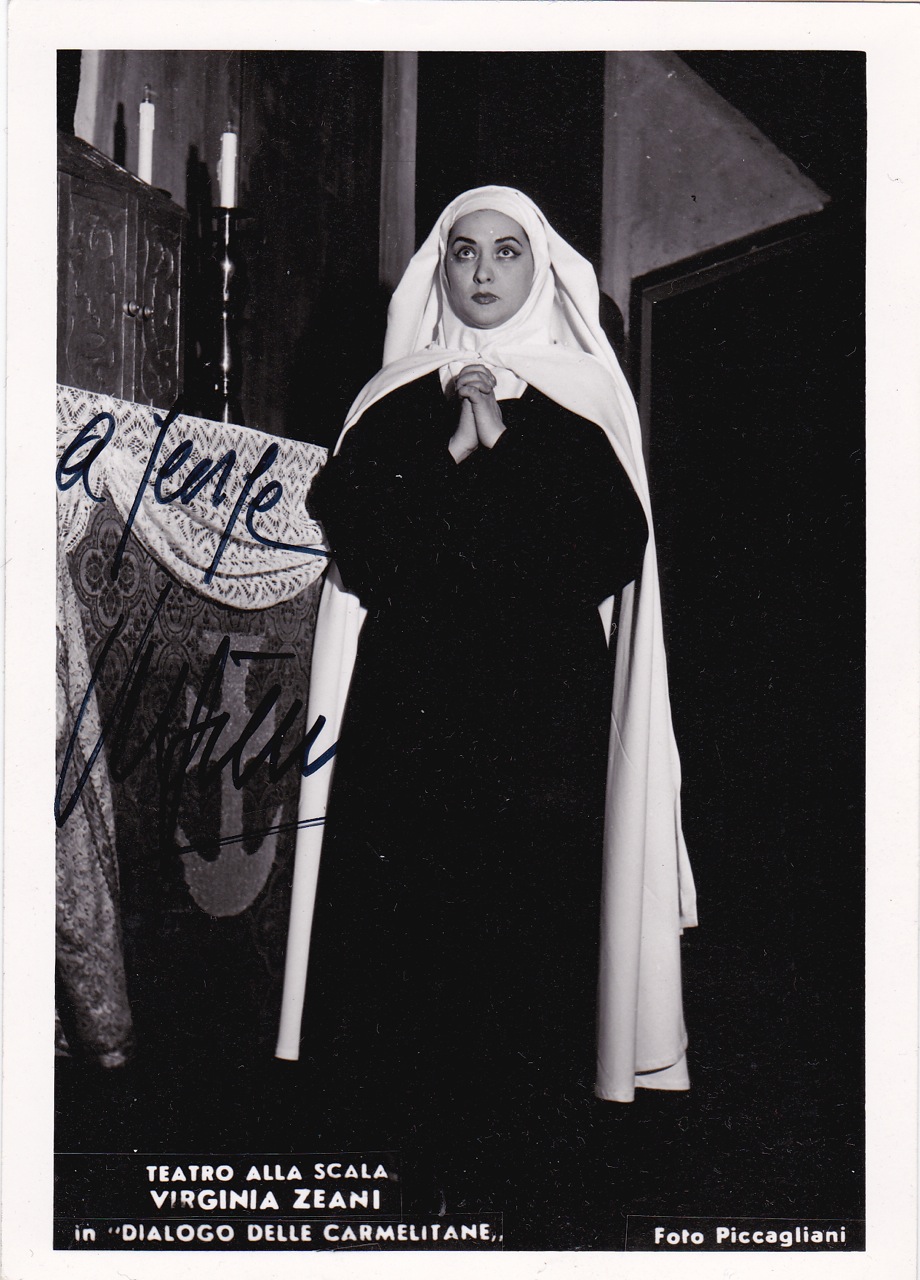
With the passing years, Virginia`s voice grew heavier and darker and so she turned towards the more spinto and dramatic roles in the soprano repertoire. A special rapport with the Teatro Liceo of Barcelona developed and she soon began putting together an entirely new repertoire with that company. Puccini roles dominated, especially TOSCA, MADAMA BUTTERFLY, and MANON LESCAUT, also she took on Giordano's FEDORA and Cilea's ADRIANA LECOUVREUR. In other words, she had finally made her entry into the world of the Verismo.
Virginia`s colleagues speak highly of her art, integrity and musicianship. She has performed with the most famous singers of her time, from Beniamino Gigli to Alfredo Kraus, Mario Del Monaco, Franco Corelli, Giuseppe Di Stefano, Luciano Pavarotti, Placido Domingo, Renato Bruson, Piero Cappuccilli, Tito Gobbi, Boris Christoff, etc, etc. Her conductors have also been high in their praise, from the grand old maestro Tullio Serafin, to Herbert Von Karajan to Zubin Mehta. Unusually for this genre, she has remained on splendid terms with many of her so-called `rivals`.
Virginia's singing career before the public, drew to a close in late 1982 with her participation in the San Francisco Opera production of Poulenc's DIALOGUES OF THE CARMELITES. Happily settled in America where she is attached to the Indiana University School of Music in Bloomington, Virginia devotes most of her time to her voice students. "I love my life as a teacher," she says. "Why? Because never was I a great diva. No! Had I been a great diva, I could not teach now."
Her student successes continue unabated. The 1997 Metropolitan Opera competitions found 16 of the finalists to be Virginia’s students. Ten were winners. Others have gone on to win singing competitions all over the world. Some of her important students are Marilyn Mimms, Sylvia McNair, Elisabeth Futrel, Susan Patterson, Stephen Mark Brown, Vivica Genaux, Marina Levitt, Kirsten Gunlogson, Mark Bowman, Tod Kowallis, Itzuko Shibata, Debra Mayer, Nova Thomas, Andrea Atkins, Katheryn Krassovic, Peter Volpe, and Angela Brown, etc. The list is certain to continue and to become very long.
Virginia as if she is an oracle dispensing paeans of wisdom on the techniques required for singing. Not only is she a master of presentation and entertainment, but she is actually able to pass on to her students the secrets of singing in a manner and form which can be understood. Many great singers take up teaching following quite brilliant careers, but few have the patience, intelligence and tolerance to pass their knowledge on to anyone else. Virginia is unique in having this fantastic gift.
--------------------------------------------------------------------------------